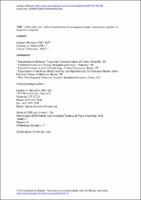Please use this identifier to cite or link to this item:
https://hdl.handle.net/20.500.12202/9364| Title: | Adults with type 2 diabetes benefit from self-management support intervention regardless of depressive symptoms |
| Authors: | Mayberry, Lindsay S. Nelson, Lyndsay A. Gonzalez, Jeffrey S. |
| Keywords: | depressive symptoms type 2 diabetes randomized controlled trial glycemic control |
| Issue Date: | 2021 |
| Publisher: | Elsevier |
| Citation: | Mayberry, L. S., Nelson, L. A., & Gonzalez, J. S. (2021). Adults with type 2 diabetes benefit from self-management support intervention regardless of depressive symptoms. Journal of Diabetes and Its Complications, 35(11), 108024. https://doi.org/10.1016/j.jdiacomp.2021.108024 |
| Series/Report no.: | Journal of Diabetes and Its Complications;35(11) |
| Abstract: | _Aims:_ Elevated depressive symptoms are common among adults with type 2 diabetes (T2D). In a secondary analysis from an RCT of a diabetes self-management support intervention that did not target depressive symptoms, we sought to determine if depressive symptoms were reduced by the intervention or, alternatively, if intervention effects on hemoglobin A1c were lesser among persons with clinically elevated depressive symptoms (i.e., depressive symptoms an effect modifier). _Methods:_ We evaluated a text messaging intervention, REACH, in a diverse (half non-white, half underinsured) sample of N=506 adults with T2D. Participants completed the Patient Health Questionnaire-8 (PHQ) and A1c tests at baseline and 6 months. We conducted a factor analysis to identify somatic- and cognitive-affective symptoms on the PHQ. We tested our hypotheses with regression models, using interaction terms and subgroup analyses. Results: REACH improved depressive symptoms among participants with lower baseline A1c (<8.5%; β=-.133, p=.007; cognitive β=-.107, p=.038; somatic β=-.131, p=.014) but not among participants with higher baseline A1c (≥8.5%; β=.040, p=.468). Baseline depressive symptoms did not modify the effect on A1c. _Conclusions:_ We found support for the hypothesis that depressive symptoms – both somaticand cognitive-affective – may be an outcome, rather than an effect modifier, of effective diabetes self-management support interventions. |
| Description: | Scholarly article / Open Access |
| URI: | https://www.sciencedirect.com/science/article/abs/pii/S1056872721002336?via%3Dihub https://hdl.handle.net/20.500.12202/9364 |
| ISSN: | 1056-8727 |
| Appears in Collections: | Ferkauf Graduate School of Psychology: Faculty Publications |
Files in This Item:
| File | Description | Size | Format | |
|---|---|---|---|---|
| Gonzalez 2021 Critchfield Adults with OA 1-s2.0-S1056872721002336-am.pdf | 186.55 kB | Adobe PDF |  View/Open |
This item is licensed under a Creative Commons License

